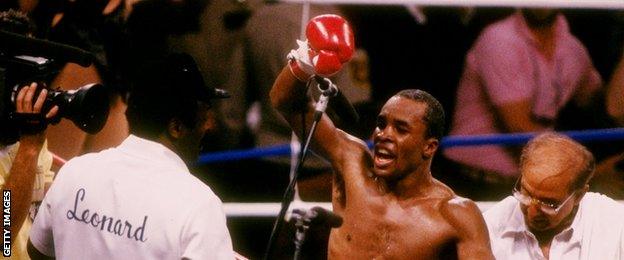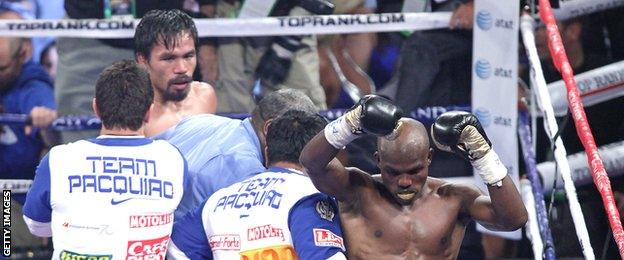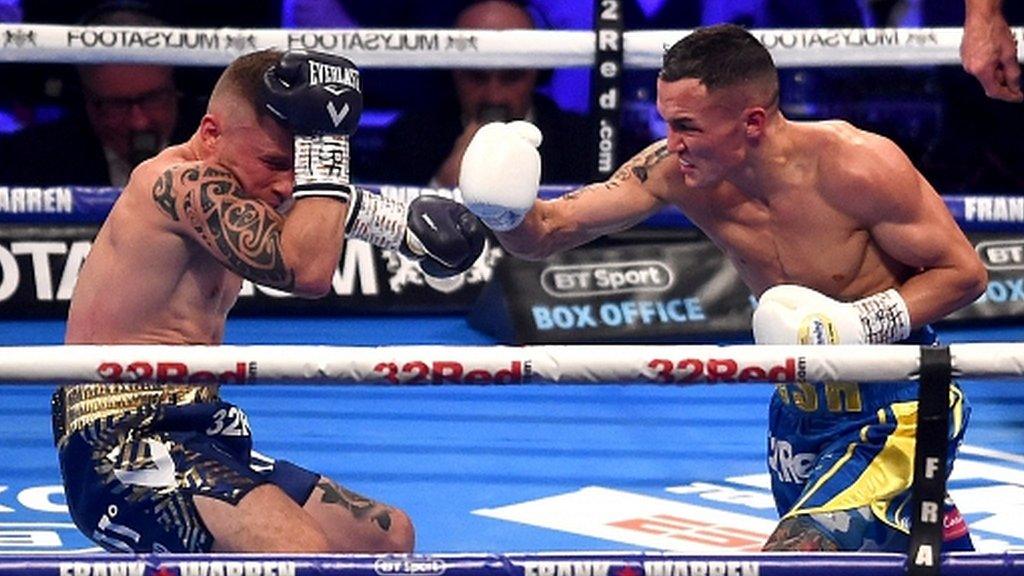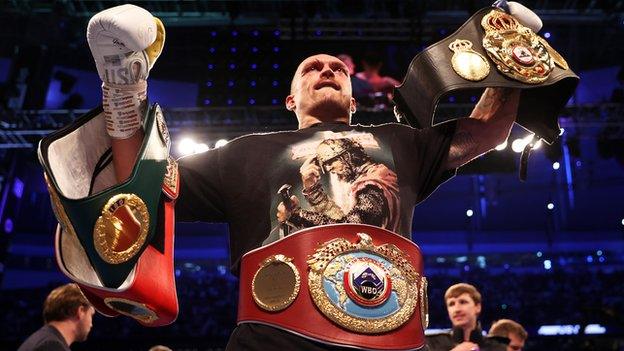Could Manny Pacquiao v Jeff Horn row have been avoided with technology?
- Published

Could wearable technology such as this be used to revolutionise the way boxing matches are scored?
With the controversy around the result of the Manny Pacquiao and Jeff Horn WBO world welterweight title fight, the accuracy of scoring in boxing is again under scrutiny.
Eight-time world champion Pacquiao called his defeat an "unfair decision", while the WBO were persuaded to review the Brisbane bout - before ruling the result was correct.
Now it is understood major players within the sport are keen on exploring whether technology could be more widely used to remove some of boxing's subjectivity.
But how might that work?
'A system with no bias'
Currently, in professional boxing, a judge awards 10 points to the winner of a round, based on the quality of punches landed, effective aggression and tactical superiority, while the other fighter receives nine or fewer.
At the Rio Olympics - in which amateurs competed - the same system was adopted, with five officials judging each bout and a computer randomly selecting three whose scores were counted.
All that is judged with the naked eye, which can lead to controversy. In Brazil in 2016, for example, Irish bantamweight Michael Conlan and Kazakhstan's Vassiliy Levit lost bouts in which they both appeared to win comfortably.
Offering to remove those debates is British company Corner, which is using accelerometer technology (the stuff your smartphone uses to detect movement) to track the different motions of a boxer's hands and measure the number and type of punches they throw.
Packed into a chip not much bigger than a 50 pence coin, the wireless hardware is concealed within the fighter's hand wraps, with one for each glove.
"I know a lot of people who can't get into boxing," Corner's CEO and co-founder Charles Burr tells BBC Sport.
"They can't understand the subjectivity of the scoring. They can't get into the match, or get excited, because they don't know who is winning.
"If we had stats scoring in real-time at the end of each round, so people could really see what is going on, that would aid the judging for the fighters and for the fans.
"This would be a system with no bias. Not even a subconscious bias. I think that is very comforting for a boxer."
US based company Hykso have designed a similar product for training purposes, but it is currently limited to gyms and clubs.
Corner has recently been tested and used by the Italian and French national boxing teams during a World Series Boxing (WSB) event, which is endorsed by the International Boxing Association (AIBA).
Burr argues that sports fans now expect stats and technology to support what they watch on screen.
Michael Conlan makes his feelings clear after his controversial defeat
So, could it happen?
Robert Smith, the general secretary of the British Boxing Board of Control, is open-minded about the idea.
"A similar technology was tested five or six years ago and didn't work," he said. "But if this has moved things on then we would look into it if there was a clear proposal."
In its current form, the Corner system is not necessarily a ready-made solution because it cannot identify on what part of the body the shots land - a key element of the scoring criteria used by judges.
"I think it is possible for us to get to a point where we could distinguish if a blow strikes the head or the body - the data from the sensors looks so much different," said Burr.
"Even if we couldn't, you would still have an indication to the accuracy, power and the number of punches, plus who has landed more. It would reduce 90% of the subjectivity of the punch stats.
"I think it is the right time for this sort of solution to come in."
The boxer's view
Joshua Buatsi, a bronze medal-winner for Great Britain in the light-heavyweight division at the Rio Olympics, says the stakes mean something must change.
"We've seen a major shift in football with the introduction of goal-line technology and I think that will be the same in boxing," he said.

The Corner system uses wireless technology concealed within a boxers hand wraps to measure factors including the number and type of punches thrown by an athlete
What do other sports do?
Both tennis and rugby have used Hawk-Eye, while cricket has its own decision review system. Football, meanwhile, is trialling video assistant referees.
But judo, wrestling and UFC (MMA) still employ traditional methods of judging bouts.
An exception among combat sports is taekwondo, which adopted electronic scoring after a series of controversial judging decisions, external at the 2008 Beijing Olympics.
Sensors fitted in the athletes' headguards and body protectors register blows, with the level of force required to record a hit adjusted for each weight category.
The consistency of the sensors was questioned in its early incarnation, but technical upgrades have improved reliability and judges still manually score all punches.
What results might technology have changed?

Victory over Hagler helped Leonard become the 10th boxer to be world champion in three different divisions
Sugar Ray Leonard v Marvin Hagler (Caesar's Palace, Las Vegas, 6 April 1987)
In one of the boxing's greatest upsets, Sugar Ray Leonard was awarded a split decision over undisputed middleweight champion Marvelous Marvin Hagler.
Hagler started cautiously, falling behind on all of the judges' cards, with Leonard avoiding toe-to-toe exchanges and scoring points with weak arm punches.
A frustrated Hagler rushed forward in search of a knockout punch and landed the harder blows, but Leonard stayed on his feet and was awarded a points victory to become a world champion in three different divisions.
Hagler reacted with disdain, stating that Leonard's "punches meant nothing," adding: "I fought my heart out. I kept my belt. I can't believe they took it away from me." He never fought again, retiring from the sport at 32.
Lennox Lewis v Evander Holyfield (Madison Square Garden, New York City, 13 March 1999)
Britain's Lennox Lewis said he was "robbed" as his fight with American Evander Holyfield for the undisputed heavyweight championship of the world ended in a draw.
The raw statistics indicated that the bout belonged to the Briton. Lewis threw 348 punches that connected, to Holyfield's 130, and landed 137 jabs to the American's 52.
A rematch was ordered, with Lewis claiming a unanimous decision to become the undisputed heavyweight champion of the world.

Bradley's controversial victory inflicted a first defeat since 2005 for Pacquiao
Manny Pacquiao v Timothy Bradley (MGM Grand Garden Arena, Las Vegas, 9 June 2012)
Five years ago Pacquiao was at the height of his powers and seemed to have done enough to retain his WBO welterweight title, with Timothy Bradley struggling with an injured foot by the fifth round.
Before the judges had been able to give their scores, Bradley reportedly told his promoter: "I tried hard but I couldn't beat the guy."
CompuBox - a system that provides real-time statistics for broadcasters - indicated Pacquiao had landed more punches in 10 of the 12 rounds - 253 to Bradley's 159.
But despite that, Pacquiao was beaten for the first time in seven years after two judges scored the bout 115-113 in the undefeated American's favour.
The Filipino won by unanimous decision in the 2014 and 2016 rematches.
- Published30 March 2017
- Published22 December 2018

- Published19 October 2020
